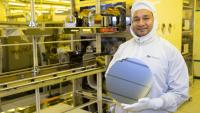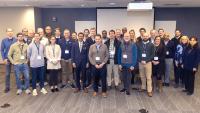5 min read
The Georgia Tech Research Institute (GTRI) conducts groundbreaking research for national defense, cybersecurity, and advanced technologies, making it a natural fit for veterans who want to keep serving. At GTRI, veterans aren’t merely continuing their careers; they’re shaping the future of defense and ensuring that those still in uniform have the tools needed for success. Together, their work creates a stronger military — and nation.
4 min read
3 min read
4 min read
This recognition celebrates West’s leadership and impact in pediatric health innovation at both the local and national level.
6 min read
Students from three Southwest Georgia high schools put their engineering skills to the test at the Advanced Manufacturing Program’s first tri‑district race, showcasing custom cars they designed and built. With strong support from educators, industry partners, and local leaders, the program is fostering homegrown technical talent. As AMP expands to six schools, communities are beginning to imagine new possibilities for their future workforce.
4 min read
2 min read
4 min read
5 min read
3 min read














